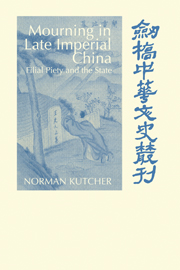Book contents
- Frontmatter
- Contents
- List of illustrations
- Acknowledgments
- A note on conventions
- Reigns of Ming and Qing emperors
- Introduction
- 1 Death and the state in imperial China: continuities
- 2 The reorientation of Ming attitudes toward mourning
- 3 The early Qing transformation of mourning practice
- 4 The bureaucratization of the Confucian li
- 5 The death of Xiaoxian and the crisis of Qianlong rule
- 6 Death and Chinese society
- Select bibliography
- Index
1 - Death and the state in imperial China: continuities
Published online by Cambridge University Press: 14 October 2009
- Frontmatter
- Contents
- List of illustrations
- Acknowledgments
- A note on conventions
- Reigns of Ming and Qing emperors
- Introduction
- 1 Death and the state in imperial China: continuities
- 2 The reorientation of Ming attitudes toward mourning
- 3 The early Qing transformation of mourning practice
- 4 The bureaucratization of the Confucian li
- 5 The death of Xiaoxian and the crisis of Qianlong rule
- 6 Death and Chinese society
- Select bibliography
- Index
Summary
As early as the Shang dynasty (traditionally dated 1766–1122 b.c.e.), ancestors in China were believed to control people's destinies, and had to be consulted through divination on the course of action their descendants should follow. Elders both living and dead demanded the obedience of their juniors in an inexorable system that encompassed a full range of religious and social meanings.
For those who sought to rule China by something more than coercion, the challenge was to create an ideology of rule that, at the very least, did not conflict with the loyalties owed to kin. Such an ideology was vital because no group could hope to rule China without the help of a network of loyal officials who would carry out orders, and faithfully report on developments in the hinterlands.
Confucianism's answer to that challenge was an ideology that sought to harmonize service to the family with service to the state: the “parallel conception of society” referred to in the Introduction. Society, as Confucianists depicted it, was held together by parallel bonds of mutual obligation. In their view, instead of an emperor's demanding that officials be more loyal to him than to their parents, the relationship of emperor to minister was parallel to that of father to son. It was precisely, Confucianists argued, because individuals were filial sons that they could be loyal officials. These loyal officials, in turn, could serve as role models for the common people.
Confucius had warned that he was a transmitter, not an innovator, and accordingly the Confucian parallel conception of society did not develop out of nothing. Shades of it appeared in various forms in early texts. According to Wang Guowei, references to ruling and filial piety can be traced back to oracle bones.
- Type
- Chapter
- Information
- Mourning in Late Imperial ChinaFilial Piety and the State, pp. 11 - 34Publisher: Cambridge University PressPrint publication year: 1999

